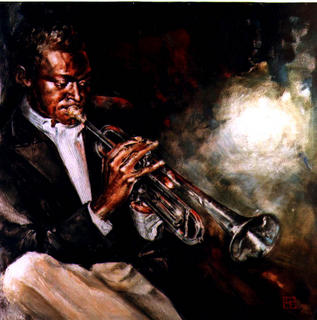 "The parallels between the lives of African-Americans battling for their freedom as citizens and that of jazz musicians for their freedom from European harmony are too close to be mere happenstance."
"The parallels between the lives of African-Americans battling for their freedom as citizens and that of jazz musicians for their freedom from European harmony are too close to be mere happenstance."
Jazz icon, Miles Davis, used to play with his back to the audience. To whites it was offensive. To blacks it was empowering. If a mere negro musician would dare turn his backs on whites in a racist society, then what else was possible? Same drinking fountains, no more lynchings, same schools…voting?
"Harmonic complexity [had become] a hallmark of modern jazz." And "the use of harmonic structure had special, extramusical significance in jazz: it was the aspect of the music that was most deeply rooted in Europe…the use of chords comes out of the European harmonic system. And jazzmen were very aware of this."
Kind of Blue was a breaking away from European musical standards. After seeing a dance troup from Africa and listening with amazement to the beats of the drummers, Miles emerged. He broke from European chord progressions as the best way to play jazz and went with a modal approach, based upon scales. And in a a 2 day recoding session with some of jazz's greats, Kind Of Blue was recorded. And jazz has never been the same. "it was voted one of the ten bet albums of all time–in any genre–and it is the only jazz album ever to reach double-platinum status….it is also a watershed in the history of jazz, a signpost pointed to the tumultuous changes that would dominate this music and society itself in the decade ahead."
There was another reason why he played with his back to his primarily white audiences. In his autobiography he says that by turning and facing the band, he could listen better, read their cues and ultimately produce a better musical experience for the audience. Miles converged.
How amazing is that! Inspite of his disdain for those who wouldn't even use the same restroom with him, he also sought to give them a gift.
(Quotations above are from Eric Nisenson's fine book, "The Making of Kind of Blue)
